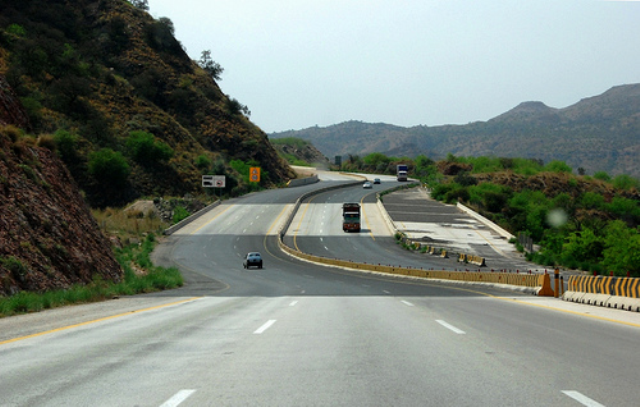68 years and counting: Chaos in absence of ‘national transport policy’
Planning and development process remains fragmented resulting in disorder and rework

A file photo of a motorway in Pakistan. PHOTO: AFP
Unfortunately, we cannot tell because Pakistan never had a transport policy.
Yes, a sector which contributes about 10% to the GDP is not properly regulated and a government that spends billions annually on development and up-gradation of national highways does not really care about a national transport policy.
Transport is the seventh pillar of Pakistan’s Vision 2025 but unfortunately this vision has not yet started to materialise into a strategic roadmap – the first step of which is the development of a holistic national transport policy.
The vision stresses primarily on increasing road-density to 0.45 km/sq.km by 2018, but building more roads in mega cities in not the solution.
The Downs-Thomson paradox is well-known in the field of urban transport, which says that new roads provide only a short-term relief to motorists and all benefits vanish due to ‘induced demand’ in the long-run. The vision should rather have emphasised that by 2020, 90% of the general public in urban areas should travel via public transport and rapid transit systems instead of private cars.
In the absence of such an integrated policy, the transport planning and development process remain fragmented; resulting in chaos and often rework.
A national transport policy should be based on the universal principles of equity and fairness, and must facilitate entry of private partners. As at present, this idea of fairness and a level-playing field leaves a lot to be desired. For instance, government established the National Logistics Cell (NLC) on the pretext that delivery of essential goods (especially oil) should not be compromised because of labour strikes and has awarded major contracts to NLC. Government has also exempted NLC from furnishing performance bonds and bank guarantees for advances, making it even harder for private entities to compete.
The task of transport policy design also requires dealing with complex interaction between myriad stakeholders – with different and conflicting agendas. These ministries include the Ministry of Ports and Shipping, the Ministry of Railways and National Highway Authority, to name a few, who have been working within their own silos and consider an integrated transport policy as a threat to their autonomy.
If we review the past progress on the approval of recommendations emanating from earlier consultations with various stakeholders, we can note that there has been a consistent lack of coordination and follow-up in this regard.
National Transport Research Centre (NTRC), a public sector research institute, produced a draft working paper in 2009 under an ADB grant, but the paper failed to materialise as NTRC was not serious in stakeholder consultation exercise. Moreover, after the 18th Amendment, the subject of transport has been devolved to provinces; adding a new layer of complexity to an already complex problem. So even the most wonderful piece of policy blueprint will just sit on the shelf, if there is little consensus between the federal and provincial actors.
Recently, this transport policy conundrum has resurfaced as international donor agencies have started asking for a national transport policy to finance various mega-projects. In the wake of more than $46 billion commitment towards the China-Pakistan Economic Corridor (CPEC) project, it is imperative that Pakistan creates a policy environment conducive to competitive pricing, entry of private players and coordination between ministries dealing with different modes of transport.
As billions have been earmarked for investment in the CEPC project, we cannot risk any delay in the delivery of projects due to a lack of consensus on an integrated transport policy. This has left the thinktanks in P-block struggling with the daunting task of coming up with a sustainable, viable and, above all, a non-controversial national transport policy framework using a holistic approach.
It is the need of the hour that officials involved in the planning process move beyond the bureaucratic politics to reinvent transport sector in the face of relentless infrastructure developments and to ensure that the investments pay off. This is by no means an easy task, albeit not an impossible one.
The writer is a Cambridge graduate and is working as a management consultant
Published in The Express Tribune, August 17th, 2015.
Like Business on Facebook, follow @TribuneBiz on Twitter to stay informed and join in the conversation.



















COMMENTS
Comments are moderated and generally will be posted if they are on-topic and not abusive.
For more information, please see our Comments FAQ